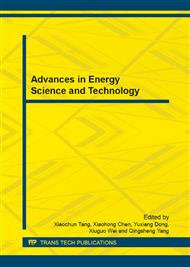p.1271
p.1275
p.1280
p.1286
p.1290
p.1297
p.1303
p.1308
p.1312
The Heterogeneity of Sectors and Related Efficiency of Differential Energy Consumption
Abstract:
Energy consumption has played great roles in the output of national economy. The proposition of low carbon economy also makes the issues about the consumption and relation efficiency to be highlighted. To investigate the efficiency of differential energy consumption along with heterogeneous sectors, the sectors and sub-sectors in Chinese secondary industry is chosen to measure the influence of energy consumption to economic output. The result indicates that the differential efficiency of varied types of energy is significant although total terminal energy consumption and related consumption in coal and oil is insignificant when without considering the heterogeneity of sectors. In addition, the significant efficiency coefficients also provide evidence to support the significant heterogeneity of sectors since the energy consumption has different effects and energy efficiency coefficients.
Info:
Periodical:
Pages:
1290-1296
Citation:
Online since:
February 2013
Authors:
Price:
Сopyright:
© 2013 Trans Tech Publications Ltd. All Rights Reserved
Share:
Citation:


